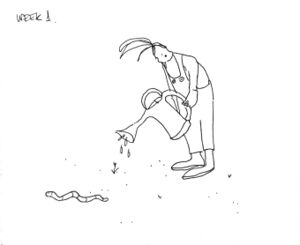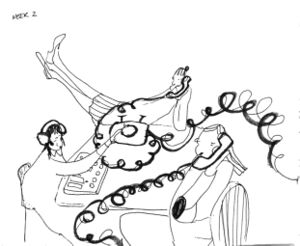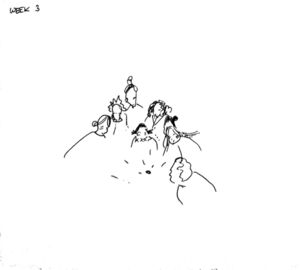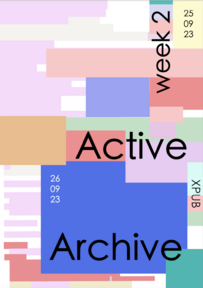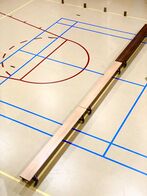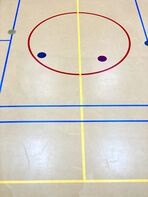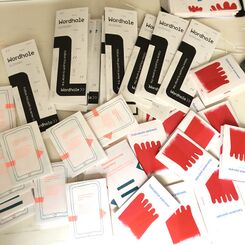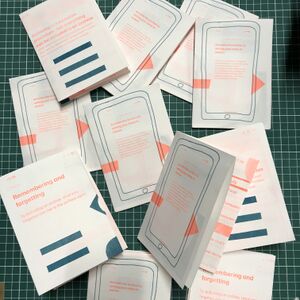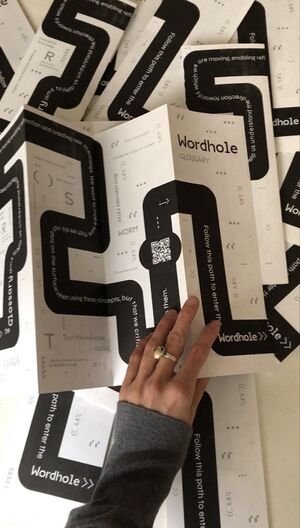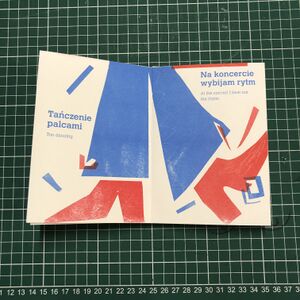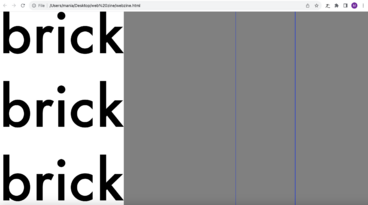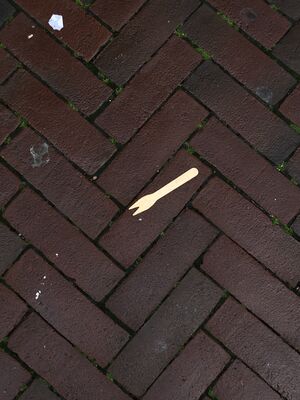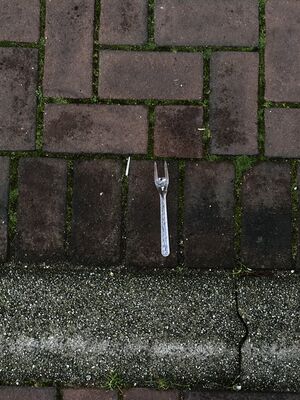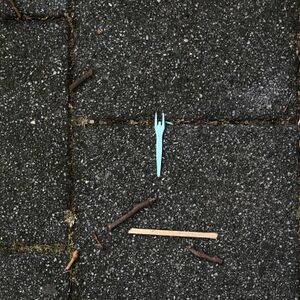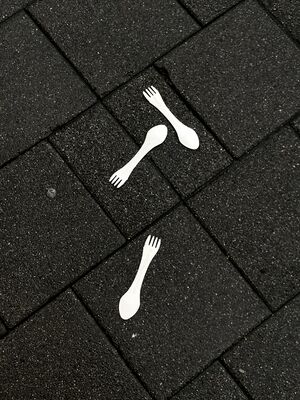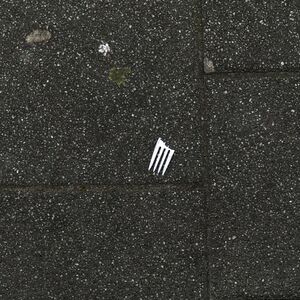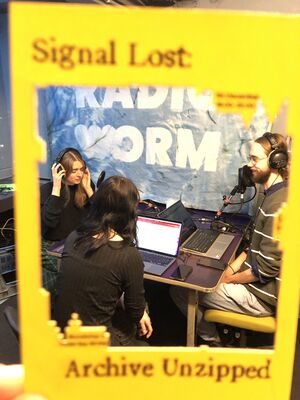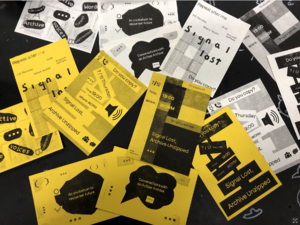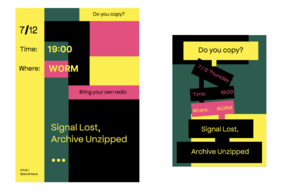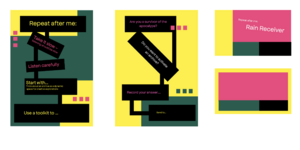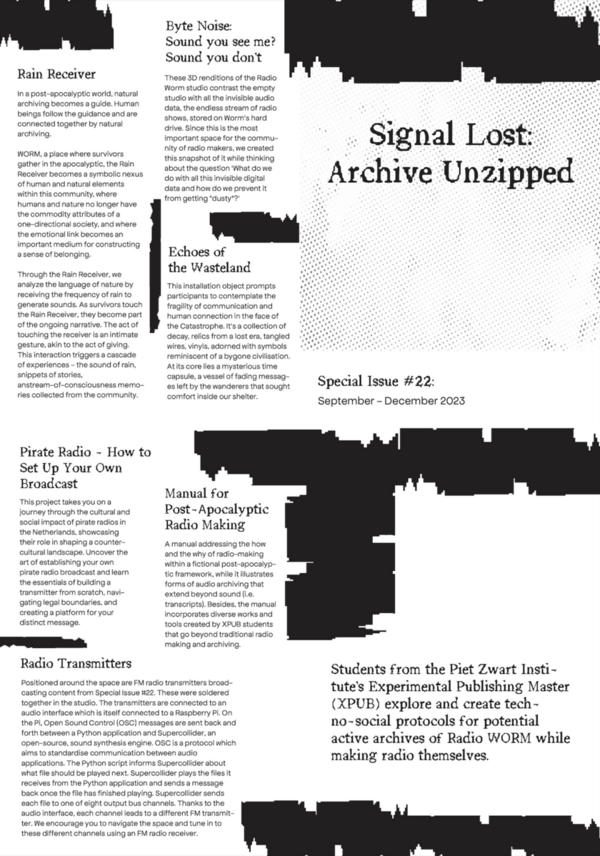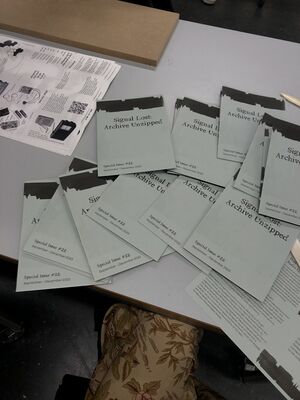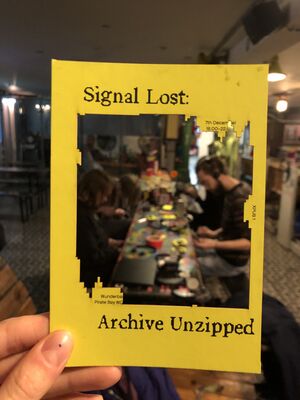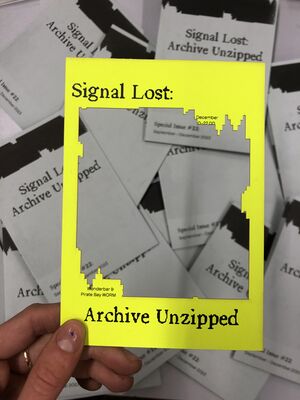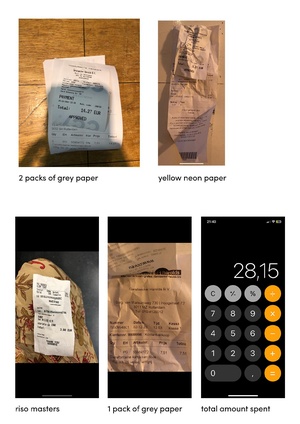User:Mania/Special Issue 22
Special Issue 22 notes, observations, reflections, findings
Week 1
Tour at WORM
Monday 18.09.2023 We met in Worm for a tour led by Lukas Simonis, Ash Kilmartin and Florian_Cramer|Florian Cramer.
Field Recording
We were experimenting with a cassette player. Based on the discussion on Radio aporee we where asked to find a field recording that triggered a memory. My sound explorations ------>>> /Field recording
Shownotes discussion
some takeaways
- Reading with the music background
- HOW TO USE VOICE DIFFERENTLY take advantage that we can whisper, talk sloooow or whatever, use our voices at the same time
- Guide listeners.. ask them to close their eyes ….
mention what is the intention of the song that we play. Make people imagine more Talk about specific details, smells, textures and use sounds for that
- For a moment remided me about scenes witrh beans hahahha
- Clear devision betweeen sections
- using the etherpad as a script. Communication between the caretakers and the classroom through etherpad has some potential
Prototyping
We set up a Raspberry Pi and create our own personal user profiles. Commands we used:
- Log in to the pi:
ssh thijsoid@145.24.139.16 - Broadcast a message:
wall [message] - Print to the lineprinter:
echo "[message]" > /dev/usb/lp0
Methods
How do I annotate?
I like how we decontruct text while annotating together, creating a patchwork
Steve:
- "Every text creates a reader."
Week 2
Active Archives
pad of today--->>> https://pad.xpub.nl/p/SI22-Monday-Sept-26
- Redefining terms like Sharing, Network, Public/Private
- Understanding the history of networked computation, and an ability to trace to contemporary practices and to make strategic decisions in creating new work
Radio Worm
This week together with Anita and Wang we were caretakers in Radio Worm. We wanted to reflect on movement, that refer not only to the body movement but everything around s which is in a contant change. Additionally we were exploring the topic of autorship, creating new meanings and interpretations. Notes for the audition can be found here ------->>>/Radio Worm
Week 3
Collaborative approach
Prototyping: We created our own radio on our servers. We produced audio files with protocols for Tuesday's radio show
SI Broadcast: Third broadcast, that used the recorded protocols and "Death of the Author" readings and our collective annotation on "Ontology of Performance".
Caretakers: Riviera, Lorenzo, Senka
Prototyping: We turned headphones into microphones and experimented with different types of microphones in teams.
Methods: We created our visual map (with different colors and bigger letters according to the importance of a word) with all the processes and practices we had developed thus far and the keywords that would be used later as basis for our glossary.
Week 4
Activating archive
This week I thought a lot about how I understand the concept of an archive. I prepared a mind map in which I listed various concepts and keywords relating to the problems or challenges that archives face. I was wondering about the selection of individual information, documents or files. I find it interesting the process of selecting what will be included in the archive and what is not important enough to be there or is simply omitted or does not fit into existing categories. This suggests that there is an inside and outside of the archive. I wanted to take a closer look at what stays outside the archive. Perhaps instead of trying to assign everything to existing categories, we should observe reality more closely. Perhaps deconstructing the existing order is the first step to start thinking about the problem of archive exclusivity.
How to emerge order from a mass of unordered information? It's so subjective.
My reflections are not intended to find a solution and design a functioning archive, but to take a critical look at the challenges and potential opportunities. I'm working on a website that will be a critical commentary. For this purpose, I have prepared a mind map with entries which I combine to create a network of dependencies. I try to visualize my thoughts about archives.
Protocoling
Protocols protocols protocols
Protocols in relation to what? In relation to collective work / trechnolgy???
Non-human protocols Discuussion during the radio show reminded me about Zoop ( https://nieuweinstituut.nl/en/projects/zoop ) An organisational model named 'Zoöp' was created to promote collaboration between nonhuman and human life while protecting the rights of all zoë, which is Greek for 'life'. The zoöp paradigm incorporates nonhuman life's concerns into organisational decision-making.
Methods
In method class we were working on a glossary. It made me think of the limitations of language. How precisely can we talk about ideas and concepts. How different I am when I speak Polish and when I speak English. Ludwig Wittgenstein said "The limits of my language means the limits of my world" Accordinh to Wittgenstein with our language we cannot fully describe reality. How does such a statement relate to the topic of archives? Are we really limited to what we can verbally understand and express?
Week 5
Autumn break
Most of the time this week was dedicated for zine camp preparation and individual projects. We have been working in smaller teams on zines related to the topics we have covered in recent weeks. We also tried to take into account the tools we learned and reflect on the insights that we gathered so far.
Week 6
I found this gym really inspiring
The more unexpected inspiration the better
| | | | |
' ; . , . < > >. >
\\\. -----------____ _ - = + | | | | ||
------- - -
|
|
|
|----------
Prototyping
During prototyping with Joseph we were manipulating tape. By cutting and connecting pieces again we created loops.
The Hitchkikers guide to an Active Archive
During this week radio show (The Hitchkikers guide to an Active Archive) Performer, Navigator and Protocoller were guiding us to get to WORMHOLE. We used a pad as a main method for communication between caretakers and the audience.
During zine camp meeting we were disscussing steps to move forward.
Week 7
Zine Camp
Zine Camp was wonderful. I had been waiting for this event for so long and I was so happy that I could be a part of it this year. It was nice to tell people what we were working on and see many familiar faces. During the event, I found the courage to conduct several interviews, asking people about their experiences with colaboration and whether they had any advice on how to make the decision-making process in the group more efficient. I have prepared 3 zines:
- "Activate the archive by setting your notes in motion"
- "Wordhole glossary"
- "Toe dancing"
Week 8
Multi-layered documentation
When working in a group, we have so many different perspectives - I think this is the strength of the group. It's interesting to see how each of us gets something different out of this process. We all participate in the same classes and the same discussions, and each of us documents this process in such a different way. Looking through the wiki pages of other people in the group brought to light things I had forgotten or hadn't noticed. Seeing this material through different eyes was refreshing and triggered new observations. I think that's where the revitalization and activation of the archive lies for me - in being able to take a different perspective.
Interviews
Interviews as investigative tool
What exactly we want to find out by interviewing people?
The goal is not to extract informatioms but instead to better understand participant's perspective on the topic by engaging them in a dialog and speaking openly
-Decide what role will interviewing play in your research?
-Why is interviewing valuable in this project? Describe the goal of the project
Together with our group of students, we are working on ways to activate the radio worm archive. As Worm organizes and hosts diverse events like film screenings, talks, exhibitions, performances and theater, concerts, workshops, and much more, it brings together an interesting community and creates a space for knowledge sharing and artistic production. By inviting people associated with Radio Worm to interview, we have a chance to understand what the purpose of the people involved is, get some insights on the importance of making things public, and also have a better understanding of the radio's audience.
Webzine-making-workshop
I attended a html and css skill-share session in Varia and worked on a web zine dedicated for the little forks found on the street.
I was thinking about the meaning of the object in the archive. It's stored not because of its singularity but for the relation and the meaning when its in relation to other stored objects.
Week9
Choosing a metaphor
Metaphor Hitchkikers guide I think Making materials accessible to a (new) audience is something very important in this project. It would be great if we could ensure that materials stay open to a variety of sensibilities.
The metaphor Hitchkires guide for me was strongly connected with the roles of narrator, performer and protocoler and what I like about that is that including more perspectives/ seeing something through different eyes could be a way to oversee the regime of archiving. Who conducts the arcghival process and how it influence it. I was trying to envision an alternative where archive has different narrators? Can we create a history of relations?
Would it work as a Multi-layered documentation? Well The archive is certainly a work of collaboration. …When working in a group, we have so many different perspectives - I think this is the strength of the group. We all participate in the same classes and the same discussions, and each of us documents this process in such a different way. Looking through the wiki pages of other people in the group brought to light things I had forgotten or hadn't noticed. Seeing this material through different eyes was refreshing and triggered new observations. I think that's where the revitalization and activation of the archive lies for me - in being able to take a different perspective. …
Those different roles of navigator, performer and protocoler made me think about Archival process as a dialogue when the community becomes also an author and owner of the archive.
Metaphor Picnic The picnic metaphor for me is strongly connected with pleasure. And thats great. Its nice to celebrate. I think that really important aspects of radio making is Enjoying what you do and connecting with other people. Materials share through radio can be accessed by many different people, and I strongly believe that the act of listening together can be a way of bringing people together.
That would be the purpose I think, to bring people together, to create a sense of belonging and to hopefully make materials accessible to a (new) audience. To start builing a sense of community we dont really need that much. There is already a lot of intresting materials to listen and If people will share a simmilar intrest it can trigger intresting conversations. I like the liveness of this concept.
Participatory aspect
- Bridge between order and disorder
- A way to activate the audience and give them agency
- Idea sharing tool
Can the cards collect the topics we discussed and the questions we encountered? Combine different aspects that are important from the point of view of archives. The content could include material from the wordhole, annotations, maybe also graphs that we created…
We talked a lot about wanting to do something for the worm community. Pattern for the card can tight together the protocols, different roles for navigation, our wordhole and different questions that matters for us.
A pattern language - Christopher alexander Work with wiki - pandoc--> https://pzwiki.wdka.nl/mediadesign/Pandoc#WIKI_to_HTML_to_PDF_to_BOOKLET_PDF Use our Glossary A collective writing tool
Can the cards collect the topics we discussed and the questions we encountered? Combine different aspects that are important from the point of view of archives. The content could include material from the wordhole, annotations, maybe also graphs that we created…
We talked a lot about wanting to do something for the worm community. Pattern for the card can tight together the protocols, different roles for navigation, our wordhole and different questions that matters for us.
Narratives
Narratives:
Are we before the apocalypse or in a post apocalypse period trying to reimagine alternatives?
Are we communicating with others from the perspective of survivors, or maybe the narrator is actualy an archive speaking to the guests or giving some instructions.. -many possibilities here; archive can be reset direclty asking people to collectively make new protocols for the future
Exploring aspects of connectivity that often remain invisible. Can participation be manifested through listening? ---> I imagine the event to be mostly audio oriented. Or at least that would make reimaging different alternatives easier I suppose, without imposing anything but by s timulating imagination and posing critical questions.
What about the space? Does worm stays worm or maybe for the event it becomes an 'active archive' and people are inviteted inside to explore the living archive that embrace not only the audio files but also the radio-makers and listeners and the community
- time
- improvisation
-soundscape
What is an apocalypse to you in relation to the Special Issue?
The apocalypse in the context of the Special Issue is a new beginning. All survivors are invited to redefine what an active archive is and how it can serve us all. Everything is gone, we lost all the files, only interviews with radio makers collected by Xpub1 have survived. Despite the huge data-loss, we face a great opportunity to re-establish protocols for archiving practices, letting people participate to integrate many different voices and experience an archive as something beyond static storage of data. This new beginning is time for us to foster co-creation and shared-responsibility. Let's listen to the interviews to recreate the world before the apocalypse and draw conclusions for the future. Ooh, it turned out that the Glossary wordhole also survived in intact condition. Lets stimulate collective thinking and together imagine future alternatives that can bring to life neglected narratives and make our practice more sustainable.
Thoughts to remember
Interview with Ari
- "People see archiving as a process of organizing
But its also a way of creating and building community."
- Archiving as a way of building community
- oral history as a form of archival practice
- archiving as an artistic practice
- "Archive is anything but the structure, there is so much space that allow person to be involved."
- "engages with people who would never normally come into contact with an archive
that's what an archive should do... engage (a public)"
- archives thrive on growth, the more you add the more space there is for dialog.
- "sense of "it's my library" (my little zine collection)... working with the archive has helped to unlearn this, a "freeing" aspect, learn to let it go (as "owned"/personal/not to share)"
Week10
Workshop: Speech recognition, Voice analysis
Questions that I have
1. I assume most of the people who will come for the event wont listen to our broadcast on 5th of december, This broadcast is crucial since the apocalypse will happen and its completely changing the whole event. How can we blend this brpadcast into the event? Or use some pieces to give more context to the whole "show" Should we use some pieces in the radio slot during the event on 7th?
2. How can we establish some protocols to navigate people during the event? For example a Mannual includes easy steps to follow, and it implies that you need to take some action in order to achieve something… maybe it wuold be a way to activate people and guide them through all of the materials that we will show. It has to be simple though, it can't include too many steps cause it will become too demanding to interact with
3. What is the audio content that we want to use during the event? Interwiews seems to be a link between our group and radio worm and other radio makers. I'm afraid our previous broadcasts might be not understandable to anyone outside of our group… Do we want to include them or not? Are we going to activate other shows randomly? Do we need a consent for that?
4. We were challengeing our understanding of what an archive can be/ from the interwviews what stand out is that
- People see archivinging as a process of organizing" But its also a way of creating and building community.
- Archive is anything but the structure, there is so much space that allow person to be involved.
- Mmaking available for a broader public
- Storing is the last on the list of what an archive does
- Archives thrive on growth, the more you add the more space there is for dialog.
How are we going to use what we discovered in the very end of the project? Is there a way to really make this event a way to make people involved, so we show that archive is beyond storage and it opens a way for a dialogue like ari also said…
5 Visuals…. Remember that ist not only about apocalypse but also about Protocols for an active archive. What about having visual things in a "mannual" style? That conect with protocols an giive a guide to audience to follow and navigate …….
Visuals-communication
Together with Bernadette and Senka we were working on visual design and communication.
We created flyers, posters, project cards and a map with explainations of the project and exhibited objects.
Map:
Maps:
Flyer:
Printed posters and tags:

